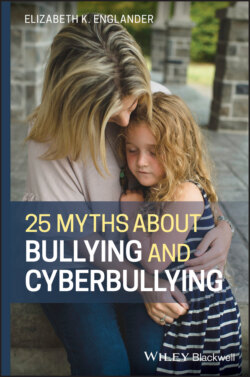Читать книгу 25 Myths about Bullying and Cyberbullying - Elizabeth K. Englander - Страница 14
3.2 Question #2: When should a parent be most worried about bullying leading to suicidal thoughts or actions?
ОглавлениеIt's clear that we don't know all the risk factors, but we can pay attention to the ones we do know about. The research suggests that the risk is greatest when the child is already struggling, or begins struggling, with additional emotional difficulties, behavior problems, or any other types of trauma. So a child who has had evidence of conduct disorders, depression, or past suicidality should be assessed if they are also being bullied. They should also be seen if they are struggling with other types of traumas or stressors, such as substance abuse, the death or serious illness of someone significant to them, family changes such as divorce, child abuse, expulsion from school, etc. Some kids are more vulnerable than others: for example, LGBTQ children may be chronic victims of social exclusion and thus might need more attention and care. The bottom line is that parents need to be aware of the signs of depression and look for these in their child. They may want to look especially carefully if they are aware that their child is being bullied or may be particularly vulnerable.
These two questions are the ones I hear the most, but they are not the only questions that remain. For example, perhaps being bullied at one age versus another is more closely linked to suicidality. At this time, researchers usually don't compare different age groups, so no real consensus has emerged, although the risk of suicide in general increases as children begin to go through adolescence.10 Another pertinent question often arises regarding the psychological impact of cyberbullying. A few studies have found that cyberbullying may be more strongly related to suicidal ideation, relative to traditional bullying11,12 (although, as you'll read in future chapters, separating the two types of bullying today doesn't make much sense). Finally, how can we tell when children and teens are actually depressed? The best method is to regularly see, talk to, and spend time with your child, so you are more apt to notice changes in their mood or behavior. Having said that, there is no absolute, completely reliable indicator – unfortunately. When you're unsure, consult a professional. It's fine to start with your pediatrician or family doctor.
